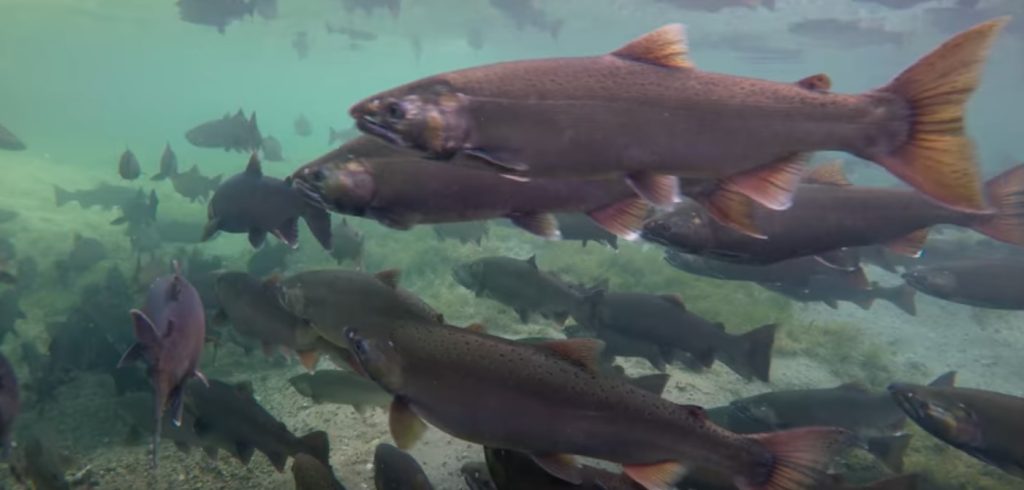
By U.S. Senators Ron Wyden
Press Release
U.S. Senators Ron Wyden and Jeff Merkley today announced that six Oregon counties will receive a combined $19.3 million from the U.S. Department of Transportation for culverts to encourage fish passage and species conservation.
“Culverts and the Salmon SuperHwy are proven methods for tackling depleted salmon and steelhead stocks while preventing floods,” said Wyden, who fought for crucial dollars to for the Salmon Superhwy that builds fish passages into existing infrastructure to ensure iconic Oregon fish species can travel upriver to spawn. “I am gratified to see these dollars go toward improving critical culvert infrastructure that prevents flooding and conserves our iconic Oregon fish species, and I will keep fight for results-driven solutions to address dwindling salmon populations.”
“The health of communities across Oregon goes hand-in-hand with the health of our state’s waterways, fish habitats, and infrastructure,” Merkley said. “The federal investments for these projects will support climate-resilient infrastructure, reconnect fish habitats, and improve critical stormwater systems. All of this helps ensure access to clean and reliable water infrastructure—access every community in every corner of our state deserves.”
These grant funds will be allocated as follows:
- $9,250,000 to the State of Oregon Culvert Aquatic Organism Passage Project so that Oregon Department of Fish and Wildlife can replace eleven culverts in the Rogue River watershed in Josephine County in critical need of repair to improve habitat connectivity for Chinook salmon, Coho salmon, cutthroat trout, and steelhead.
- $2,348,000 for Lane County Public Works for the Shaw Creek Crossing Culvert Replacement, including new fish passage at Shaw Creek, a tributary to the main stem of the Siuslaw River, opening up nearly five miles of salmonid spawning habitat.
- $1,430,480 to the City of Troutdale for the Beaver Creek Fish Passage Restoration, replacing existing Troutdale Road culvert and fish ladder on Beaver Creek with a new at-grade bridge.
- $1,492,800 to Tillamook County to replace two fish passage barriers on Brickyard Road at Mill Creek, part of the Salmon SuperHwy strategic effort to restore 95% of historic habitat connectivity for salmon, steelhead and Pacific lamprey, while reducing flooding and improving public safety in the flood-prone coastal community of Tillamook County.
- $800,000 to Coos County for Palouse Slough Primary Tide Gate Upgrade to restore passage for aquatic species in the Palouse Subbasin.
- $1,490,792 to the Coquille Indian Tribe for the Smith River Basin Priority Passage Projects to improve passage to spawning and rearing habitat for Chinook Salmon, Oregon Coastal Coho Salmon, Oregon Coast Steelhead, and Cutthroat Trout, Pacific Lamprey as well as resident populations of Rainbow and Cutthroat Trout, Western Brook Lamprey, and other native fish species.
- $1,490,320 to Clackamas County for culvert near Rhododendron to prevent flooding by replacing small culverts with a modular 20-foot clear span bridge over Conway Creek and provide access to upstream spawning and rearing habitat for Coho salmon and steelhead.
- $617,600 to Tillamook County for the Myrtle Creek Salmon SuperHwy Fish Passage Restoration Project, replacing one fish passage barrier on Kilchis River Road to restore habitat for Oregon Coast Coho salmon as well as Chinook salmon, Chum salmon, Steelhead trout, Pacific lamprey, and Coastal Cutthroat trout.
- $388,800 to Lincoln County for Anderson-Drift Creek, a major tributary of the Siletz River estuary, to design the replacement of three existing culverts to prevent flooding.
“The Salmon SuperHwy’s progress is only possible because of our collaborative partnership around the shared mission of building lasting infrastructure to benefit the whole community. By replacing undersized and failing culverts, we can reconnect essential habitats for fish and aquatic organisms, while at the same time improve the transportation system, decrease flooding, and increase climate resilience. We thank Senators Wyden and Merkley for their continued support of the Salmon SuperHwy Partnership,” said Salmon SuperHwy Director Liz Ransom
“Failing and undersized culverts block salmon from reaching critical spawning habitat and also results in local flooding. With this funding, Clackamas County will be able to replace two failing and undersized culverts that convey Conway Creek under Aschoff Road,” said Clackamas County Commissioner Paul Savas. “This project near the rural community of Zigzag will enhance the well-being of the community and the environment.”
“This award provides Lane County with critical funding needed to ensure the safety of the traveling public, while protecting the headwaters of the Siuslaw River, its vulnerable aquatic species, and the surrounding watershed. It’s a win-win for our region,” said Lane County Commissioner Ryan Ceniga.
“The Coquille Indian Tribe is pleased and honored to receive $1.49 million from the US Department of Transportation to support critical culvert replacements for fish passage. Oregon Senators Ron Wyden and Jeff Merkley have been instrumental in leading essential habitat work, and we are grateful for their commitment to Oregon fisheries. This project, on the Smith River in Western Douglas County, is just one of many projects that the Coquille Indian Tribe, in collaboration with entities like the Smith River Watershed Council, is spearheading to ultimately rebuild our once abundant native fish populations,” said Chair Brenda Meade of the Coquille Indian Tribe.
Disclaimer: Articles featured on Oregon Report are the creation, responsibility and opinion of the authoring individual or organization which is featured at the top of every article.

